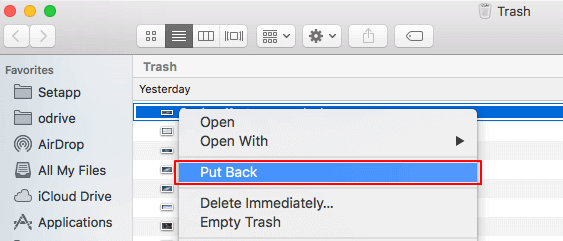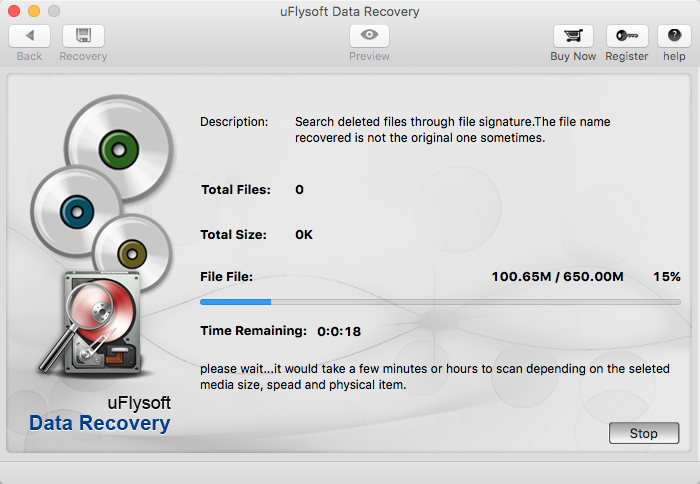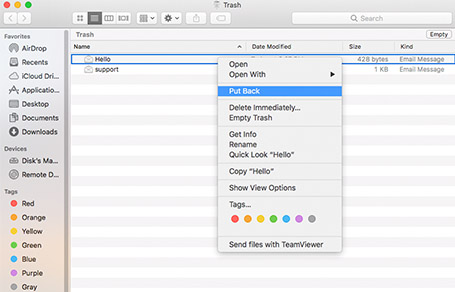

- #How do you recover lost files on mac full version#
- #How do you recover lost files on mac download#
- #How do you recover lost files on mac free#
- #How do you recover lost files on mac mac#
#How do you recover lost files on mac free#
The free version only scans for files and shows you that they exist.
#How do you recover lost files on mac full version#
Note that you will need to buy the full version of Disk Drill to recover files. Your odds of recovery will go down for older files-since your computer has had more time to overwrite them-so it’s best to act quickly after discovering you’ve accidentally deleted a file. I deleted a screenshot on my desktop, emptied the Trash, and was then able to recover it with Disk Drill, 100% intact. If all goes well, you should see your recovered files appear in the directory you chose. For this demonstration, I just used my hard drive, and it worked fine. Ideally, you should use an external drive to prevent other files from being overwritten. Once you’ve found the files, right-click them, choose the “Recover” option, and then select the directory where you’d like to save the recovered files. Most files should be under your home directory with your name on it. Many of these are junk, but if you know what you’re looking for (pictures, for example) you can sort them and open the folders you want. The scan may take a few minutes, but when it’s done, you’ll be presented with a list of recently deleted files. Select OS X if you want to scan your main disk. When you open it for the first time, Disk Drill will ask you to select your disk and perform a scan.
#How do you recover lost files on mac download#
The last thing you want is that download overwriting the data you want to recover.

Note that any extra data you put on your hard drive could overwrite the files, so if you’re extra cautious, download Disk Drill on another computer and put it on a flash drive.

It scans your hard drive for any files that are still waiting to be overwritten and recovers them for you, bringing your documents back from the computer grave. One tool that does this very well is Disk Drill. This means that if you have an app that can read the files directly off your hard drive, you could recover them in full if you do it quickly enough after deletion. Your data is still there until it gets overwritten by something else. Instead, macOS marks them as available space.

If All Else Fails, Use Disk DrillĮven when you empty your trash, deleted files aren’t removed from your hard drive right away. Should you want to stop showing hidden files (they’re hidden for a reason, and there are a lot of them), you can run the same commands in Terminal again, but replace “TRUE” with “FALSE” on the first line: defaults write AppleShowAllFiles FALSE You can even empty it from Finder to clear some space on a USB stick. At the prompt, paste these two lines in there one at a time, hitting Enter after each line: defaults write AppleShowAllFiles TRUEĪfter running these commands, you should be able to see the “.Trashes” folder. Press Command+Space and type “Terminal” to bring it up. You can enable hidden files in Finder by running the following commands in Terminal. If you’re using macOS Sierra or later, you can view hidden files in Finder by simply using the SHIFT+CMD+. One of these hidden folders is “.Trashes” and it contains the trash for that drive.
#How do you recover lost files on mac mac#
Whenever you use an external drive, your Mac creates a bunch of hidden folders starting with a period to help the drive work better with macOS. They’re hidden by default, though, so you have to do a little digging. If your file was stored on a USB flash drive or external hard drive, those have their own Trash you can check for deleted files. And if you haven’t emptied it in a while, doing so might get you back quite a bit of disk space. It should give you a list of files that you’ve deleted recently-at least, since the last time you emptied it. Right-click it and click the “Open” command. The Trash is usually located at the end of your dock.


 0 kommentar(er)
0 kommentar(er)
